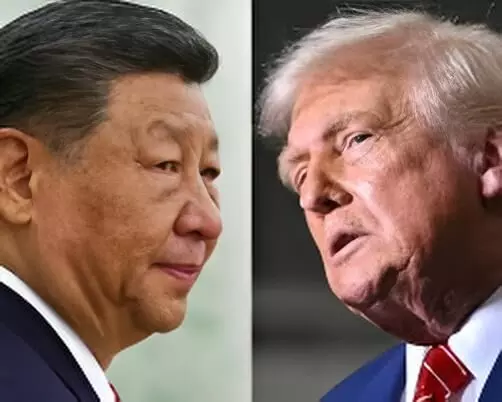Trump Imposes 100% Tariffs on China: What It Means for US and Indian Stock Markets — Explained
US President Donald Trump’s 100% tariffs on Chinese imports could trigger global market volatility. Here’s how it may affect the US economy, China’s exports, and India’s stock market.
US President Donald Trump announces a 100% tariff on Chinese imports, sparking global market concerns.

In a move that has sent shockwaves through global markets, US President Donald Trump announced a 100% additional tariff on Chinese imports, effective November 1 or earlier. This comes on top of the existing 30% tariff, escalating trade tensions between the world’s two largest economies. The Trump administration has also introduced export restrictions on critical American software, citing retaliation against China’s new curbs on rare earth exports.
Impact on the US Stock Market
Experts warn that Trump’s aggressive tariff hike could reignite trade war tensions and strain the global economy, impacting equities and risk assets.
According to V.K. Vijayakumar, Chief Investment Strategist at Geojit Financial Services, “This decision could have short-term negative implications on global markets, including India. It remains uncertain whether Trump will follow through or soften his stance, as he did previously.”
He added that such a trade war could fuel inflationary pressures in the US, complicating the Federal Reserve’s policy response amid slowing job growth and stubborn inflation.
“The probability of the US slipping into stagflation is rising. If these tensions persist, markets currently trading at high valuations could see sharp corrections,” Vijayakumar cautioned.
Global and Chinese Market Reactions
G. Chokkalingam, Founder and Head of Research at Equinomics Research Pvt. Ltd., believes the move will weaken global markets.
“The US will likely face higher inflation and slower GDP growth, while China’s export-driven economy will suffer from declining trade volumes,” he said. “Since both nations play a central role in global trade, equity markets worldwide could turn volatile in the short term.”
How Trump’s Tariffs Could Affect India
While the new tariffs directly target China, India is also on Trump’s radar. The US recently imposed a 50% tariff on Indian goods, although trade negotiations between New Delhi and Washington continue.
Prime Minister Narendra Modi spoke with President Trump on October 9, discussing progress on a potential bilateral trade agreement and broader strategic cooperation.
Experts suggest that India may escape the worst of the global fallout, given its growing strategic importance to the US.
“Tactically, Indian markets could remain resilient,” said Chokkalingam. “The US may soften its stance towards India to avoid strengthening the China-India-Russia axis.”
A Silver Lining for Indian Markets
Interestingly, the trade war could have a positive ripple effect for India. Following the tariff announcement, global crude oil prices fell by 24% from their 52-week high.
“Falling oil prices will reduce India’s import bill, lower inflation, and stabilize the rupee,” Chokkalingam noted. “This could attract foreign portfolio investments (FPIs), especially if the US maintains a softer approach toward Indian exports.”
Currently, India’s benchmark Nifty 50 index has risen nearly 3% in October 2025, fueled by strong earnings expectations and optimism surrounding the India-US trade deal.
Key Takeaway
Trump's imposition of a 100% tariff on Chinese goods is a significant milestone in the global trade order. India, which is the main indirect beneficiary in the scenario, will not only receive lower oil prices and probably capital inflows but also the "if" factor of skillfully handling the changing geopolitical scenario. On the other hand, the U. S. is facing inflationary risks, while China is suffering from export slowdown.

